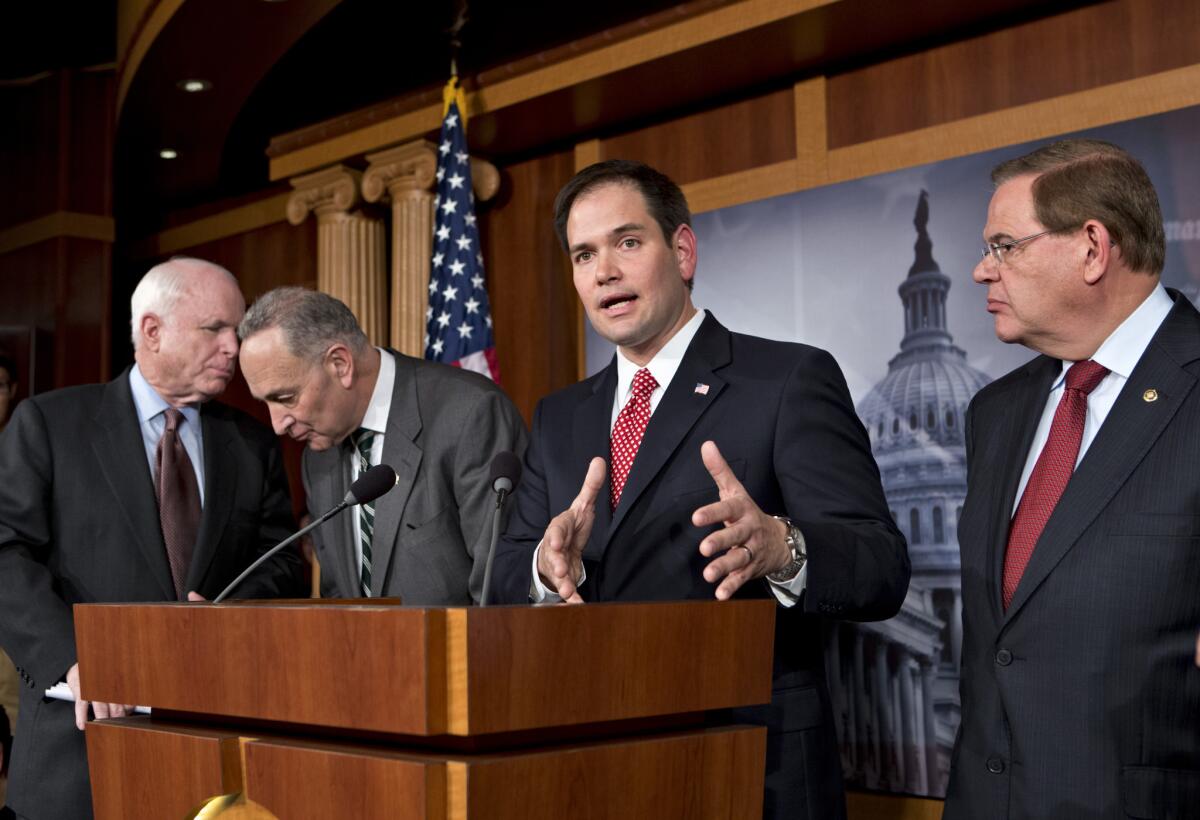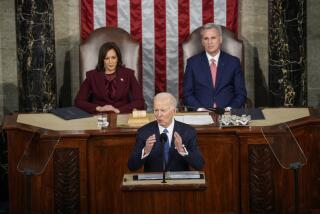What Marco Rubio’s foray into the 2013 immigration overhaul push revealed

Sen. Marco Rubio and fellow Gang of Eight members at a 2013 news conference on their immigration overhaul proposals.
When a bipartisan group of senators dubbed the Gang of Eight began tackling immigration reform in 2012, a key goal for members was to keep Sen. Marco Rubio (R-Fla.) in the fold.
Rubio said he would be unable to convince fellow conservatives to support a special path to citizenship for the 11 million people in the country illegally, so an alternative was devised. It was a complicated workaround that avoided creating a special process but increased the total number of people who could become citizens. Rubio signed on.
It was only later that he and the other senators discovered that the new approach, with its larger overall number, would backfire politically and lead to more objections from same conservatives Rubio was trying to mollify. The bill passed the Senate with Rubio’s vote, but he then withdrew his support amid a conservative backlash and the legislation died in the House.
TRAIL GUIDE: All the latest news on the 2016 presidential campaign >>
The episode was one of several in the drafting of the landmark immigration reform bill that provide a window into the legislative and political skills of Marco Rubio, now seen by some in his party as the most promising Republican presidential candidate.
During the immigration battle, Rubio showed keen political instincts and a quick grasp of tricky policy issues. Fellow senators saw him as a hard worker, willing to roll up his sleeves to hammer out a deal, even canceling a flight home one weekend as negotiations dragged all night.
But as shown in the problematic citizenship workaround that was created for him, Rubio also became known as a relatively inexperienced lawmaker whose short-term political calculations sometimes worked against his long-term goals.
Those who watched Rubio during the negotiations -- most of whom did not want to be identified criticizing the up-and-coming presidential candidate -- described him as, at times, an unsteady negotiator, using terms like “antsy” and “jitterbug.” They say he sometimes failed to recognize his own leverage and occasionally left money on the table.
For example, though Rubio got credit for toughening citizenship requirements, he probably could have gotten more, according to one former aide to a senator involved with the talks, granted anonymity to discuss the private sessions.
At one juncture, Rubio questioned why the bill did not require that immigrants prove they had been in the U.S. for at least five years, as was the case in a 2012 executive action by President Obama. Privately, Democrats thought it was a valid point and were prepared to cave.
To their surprise, Rubio agreed to residency for just half that time.
“Here he was on rock-solid ground, and just gave it up,” the aide said.
Rubio supporters, however, insist he also won crucial concessions from Democrats in important areas, such as a provision ensuring that any citizenship process could only come after certain border-security requirements were satisfied.
“Rubio at the outset got them to agree,” said a Republican familiar with the talks. “The triggers would have never existed.”
Supporters see Rubio’s decision to abandon the immigration bill after it passed the Senate in the summer of 2013 as a savvy political move, since he realized it had become a losing battle.
But skeptics say it also suggested that his political survival instincts could overrule his commitment, as the son of Cuban immigrants, to fixing what he still calls a “broken” immigration system.
“He betrayed our cause in a way that set us back for years,” said Frank Sharry, executive director of America’s Voice, a leading advocate of immigration reform who closely monitored the talks.
“Everyone understands politicians flip-flop. But you kind of have to own it,” Sharry said. “To speak with equal conviction in a matter of months on opposition positions, that to me represents a fraudulence and a lack of character.”
Rubio’s campaign declined to comment for this story.
Rubio’s participation with the Gang of Eight -- four Republicans and four Democrats committed to immigration reform -- was supposed to be a win-win. It gave the freshman Florida senator a starring role in an ambitious legislative undertaking, something lawmakers can wait a lifetime to reach.
And the others gained a rising Republican star whose conservative credentials and tea party backing were put to use on conservative talk radio and Fox News, selling the bill to the party’s hard-right flank.
“I saw a guy who was extremely bright, extremely involved in the issues, given his Florida experience in legislative office there, and I thought he was someone who could really help because I thought he was smart as hell,” said Sen. John McCain (R-Ariz.), who organized the group. “And was I disappointed when he backed off of it? Of course I was.”
When Rubio was recruited for the effort, Sharry recalled thinking it would make him the Republican Party’s newest star.
“I thought: My God, we’re going to have the next president,” Sharry said. “This guy is using his political capital to modernize his party, put this issue in the rear-view mirror and position himself to be the next president.”
The senators often deferred to the charismatic young Rubio -- accepting his political assessments and stifling grumbles when he arrived late or left meetings early without apology.
“He knew, ‘You guys need me,’” said another aide to a Democratic senator during the talks. “Everyone recognized he was the guy who could blow this up” if he walked away.
From the outset Rubio played his assigned role well, always the skeptic who repeatedly argued that one provision or another wouldn’t fly with conservatives.
“There were several occasions I remember him saying, ‘How am I going to message this? How am I going to get Republicans to sign onto this?’” said a third aide, who worked for a Democrat involved in the talks. “He usually came at it much more from a political angle than getting into the policy specifics.”
But those involved say Rubio also showed a willingness to pressure conservative constituencies when needed.
Giev Kashkooli, a vice president at United Farm Workers, remembered Rubio holding a final round of farmworker negotiations in his office, warning business leaders that the alternative would be worse if they failed to agree to a new agricultural visa program.
“We definitely entered with skepticism, but I ended up believing in his fairness,” Kashkooli said.
Across the table, business leaders walked away with a similar assessment.
“Marco was sort of down the middle, trying to come up with a bill that was fair to all sides,” said one business official deeply involved in the talks. “He wasn’t reflexive or Pavlovian-dog-like on any issue, because he knew there were a lot of things that had to be balanced.”
Other scenes, though, exposed the shortcomings of the senator who had been on the job just two years.
He largely outsourced his negotiating role over the high-skilled H1-B program to an immigration attorney from Miami who was a former colleague from the West Miami City Council. That raised eyebrows over the apparent conflict of hiring a corporate lawyer with ties to companies that rely on foreign workers.
The bill ultimately tripled the number of high-skilled visas, and included specialty carve-outs for cruise ship lines and hurricane relief workers.
Just as the citizenship work-around plan backfired, those carve-outs eventually became just another lightning rod for critics of the bill.
Twitter: @lisamascaro
MORE POLITICS NEWS
The more Trump is bashed, the more his supporters back him
Donald Trump deepens the divide between Republicans and voters overall
Democrats campaigning aggressively on gun control, dropping longtime reticence
More to Read
Get the L.A. Times Politics newsletter
Deeply reported insights into legislation, politics and policy from Sacramento, Washington and beyond. In your inbox three times per week.
You may occasionally receive promotional content from the Los Angeles Times.







